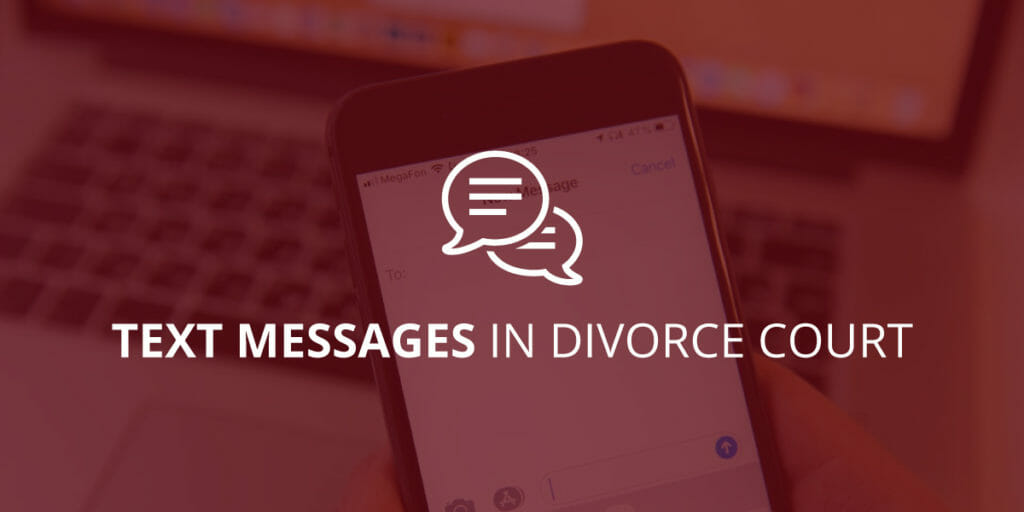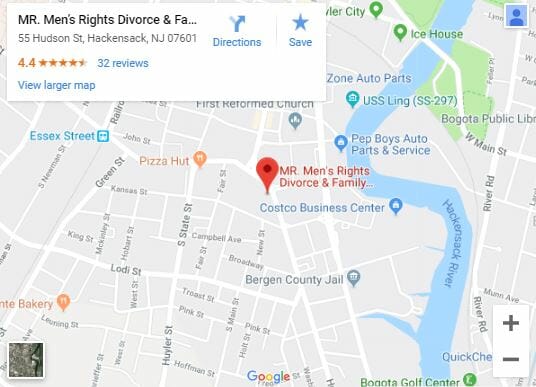
It’s never been easier for us to communicate with our family and loved ones via emails, social media direct messages and text messages. Still, these electronic messages may also portray the negative aspects of a marital relationship. If a marriage is heading toward divorce, text messages may be accepted as evidence in divorce court.
If you are divorcing in New Jersey, be very careful what you say in text messages to your spouse or others. Consider that anything you say in electronic communications could end up as evidence in court and be used against you. On the other hand, negative messages sent by your spouse could be beneficial to you as evidence in divorce.
Our team of men’s rights divorce lawyers is vigilant in using text messages and other electronic communications to help clients gain the evidential leverage they need to obtain favorable divorce settlement outcomes. On the other hand, if you were the sender of angry or inappropriate texts that may be used as evidence, we will work hard to reduce their impacts against you.
When you are undergoing divorce and are wondering what your options are in terms of bolstering your overall standing with the court, don’t hesitate to call us at (201) 340-9036 to arrange a case evaluation so we can delve deeper into your current situation and devise the best legal strategy available to you.
Admissible Use of Electronic Messages In Divorce Hearings
To be successful within any kind of contested divorce proceeding, it’s important to be able to provide legitimate evidence that proves your case. Texts and emails have emerged as one of the most important types of evidence within divorce settlements.
There are several ways in which text messages may be used in divorce court, and it has become a lot more than as digital “lipstick on the collar.” When relationships end, all electronic messages are still available to both parties. They are often used as incriminating evidence against an ex-spouse to win in child custody battles and other divorce decisions.
Many divorce attorneys report using text messages, emails, and social media digital messages throughout hearings. There are some arguments throughout the industry that these types of messages are confidential and private, but, they are not and any communication between the parties is not privileged in a family court action (except if it has severe criminal implications) and can be used as evidence. .
This is why we’re continuing to see countless ex-spouses provide emails, direct messages, and text messages to court.
The overall admissibility of electronic messages is still a very important factor, and this is because the way the evidence was obtained is always a major consideration.
Text Messages and Emails Sent Directly To A Divorcing Spouse
A lot of people believe they are fully aware of how the law works around obtaining digital evidence within family court. The overwhelming number of parties who come to family court prepared with printed text messages and emails sent from their opposing party is a clear indication as to the trajectory of this type of modern, sometimes controversial, evidence.
If you’ve received text messages from your ex-spouse, you can always upload these messages through a computer and have them printed out utilizing a smartphone app. There are many instances in which text messages can be used to show evidence of verbal/sexual abuse, any type of admission of wrongdoing, and any other messages that an ex-spouse wouldn’t have wanted to send in the past if they had known it could be used as evidence against them in divorce proceedings. But not all of this evidence may be valid or admissible. A divorce attorney can advise you in this area.
Retrieving Electronic Evidence
These days, there are many ways in which text messages and emails can be retrieved by a party who didn’t originally receive the messages, but the validity of this evidence is always scrupulously analyzed. There are instances in which parties can request a thorough inspection of an entire computer, and that’s when a computer forensics expert can legally retrieve controversial documents and emails that may have even been erased from within a hard drive.
There are laws that prohibit any kind of unlawful collection of electronic communication, so everyone should be cautious when it comes to accessing their ex-spouse’s computer without their permission. Doing so may end up resulting in the exclusion of electronic evidence and can subject individuals to certain sanctions and criminal prosecution.
But many spouses, of course, will access the same computer or work on each other’s personal computers, so there are some instances in which accessing devices that were purchased with marital funds is permissible. However, there are very important exceptions, one of which is to prove that you had authority, express or implied, to access the device where the digital evidence was stored.
Can You Subpoena Text Messages?
Text messages can be retrieved through a subpoena to a cell phone provider. Only an attorney can subpoena these types of documents, and you’ll have to be able to provide a good reason for requiring private messages in order to be successful.
The other party can also take steps to legally deny access to some of these documents, so it’s important that you understand this process so you can ensure you’re doing it by the book.
Cell phone providers keep the overall content of a text message for only about three days, so there tends to be a limited time in order to obtain any substantial evidence from data carriers.
But there are certain steps you and your attorney can take in order to get text messages by subpoena, including the following:
- Get in touch with the cell phone carrier and tell them that the specific content of your ex-spouse’s text messages needs to be preserved because they are legal evidence in a divorce proceeding. An experienced divorce attorney can craft this letter for you and cite the necessary provisions within the Stored Communications Act and any applicable New Jersey state laws. This letter must be certified and sent via overnight delivery.
- Next, your attorney must prepare the subpoena that seeks out the relevant text messages that will support your case.
- The third step is to file an application or, where appropriate, an ex parte motion within your divorce court proceeding that requests the court to order your ex-spouse to sign a notarized consent to release the content of the text messages.
- The last step is to serve the subpoena.
Authenticating Electronic Evidence In Court
Any electronic data that’s used as evidence within the divorce court must be authenticated, which means you’ll have to prove that your ex-spouse was the one who actually wrote or sent the messages. The easiest way to get this type of authentication is to have your ex-spouse simply admit to creating the messages, but this is, of course, a lot easier said than done.
A third-party eyewitness to the creation of the messages can also be utilized to authenticate certain digital data, but this is rarely an option. This is why many family courts will accept some circumstantial evidence to authenticate digital messages, a common example being that the messages contain certain information that only your ex-spouse would know.
Authentication of text messages and all electronic evidence is important in all legal proceedings because it helps courts verify that there wasn’t any third party involved that used an individual’s phone or computer to send pseudo-incriminating messages to their spouse.
Electronic evidence is good to use to prove or support a very specific legal claim, but not often used to “prove” that you want a divorce. Most people file for divorce under irreconcilable differences unless there is an important reason not to, which your divorce and family law attorneys can discuss with you further.
What Should You Not Text During a Divorce?
Basically, do not text anything during a divorce that could portray you in an unfavorable way in court. This includes texts:
- In which you call your spouse names or make derogatory comments about them
- That include obscenities,profanities, or visually inappropriate content (sexting)
- That could be seen as threatening or violent
- That is dishonest and may hurt your credibility with the judge.
Be aware also that this does not only apply to texts or other electronic messages you send to your spouse. Texts sent to relatives, family friends or other third parties could also potentially be used against you.
When you must text your spouse during divorce, keep emotion out of your messages. Be polite, neutral and to the point about your reason for texting, and do not let your spouse goad you into a fight over text. Be sure to save any messages you received from your soon-to-be ex-spouse that are nasty, derogatory, threatening or otherwise inappropriate.
Speak With a New Jersey Men’s Rights Divorce Lawyer To Learn More
Divorce is stressful for all parties involved. When parties engage in name calling and other negative behavior in text messages and other electronic communications, it can make it even more so. This is true both on a personal level and in the court of law, if detrimental text messages are introduced as evidence.
At Mr. Men’s Rights Divorce & Family Law, by Schultz & Associates, LLC, we have helped people throughout New Jersey with their divorce and family law legal problems. If you’re divorcing, our experienced lawyers can assist you throughout the proceedings and work to get you the most advantageous result for your situation, including when inappropriate text messages may be used as evidence, either in your favor or against you.
We encourage you to call us at (201) 340-9036 or reach out online to learn how we can help you.
Once we have a more thorough understanding of your circumstances, we’ll be able to initiate the important first steps toward protecting your rights.

